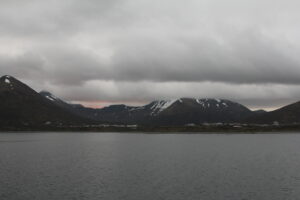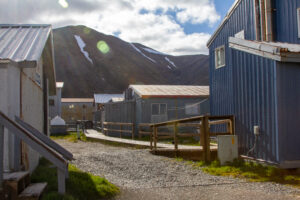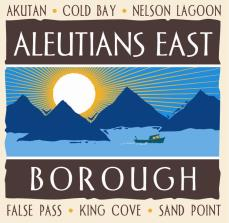Audio of the meeting:
https://apradio.org/mp3/2025-01-10-adfg.mp3
For Immediate Release: Nat Nichols, Area Management Biologist
Cassandra Whiteside, Asst. Area Management Biologist
January 3, 2025 (907) 486-1840
2025 South Peninsula District Commercial Tanner Crab Fishery Preseason Meeting Announced
https://www.adfg.alaska.gov/static/applications/dcfnewsrelease/1650055833.pdf
The Alaska Department of Fish and Game (ADF&G) will hold a preseason meeting teleconference at 1:30 p.m. Friday, January 10, 2025, hosted by the Aleutians East Borough (AEB). The purpose of the meeting is to provide information regarding the 2025 South Peninsula District Tanner crab season.
Topics of discussion will include:
• Preseason vessel registration and buoy tag requirements
• General ADF&G inseason management and harvest reporting
• Eastern Section subsection management for the 2025 season
• Summary of recent Tanner crab trawl survey results
Interested parties may join the teleconference in person at the AEB offices in Sand Point, King Cove or Anchorage, or the False Pass city office; interested parties may also join virtually (meeting information below). This meeting is open to the public.
Join using Microsoft Teams:
Meeting ID: 285 323 550 922
Passcode: Pq7pU6uv
Join by phone:
Phone number: (323) 433-2327
Conference ID: 399 608 463#
For more information on Tanner crab harvest strategies, survey results, or inseason management, contact
ADF&G in Kodiak at (907) 486-1840.
-end-
CALL FOR PROPOSALS: Alaska Board of Fisheries
THE ALASKA BOARD OF FISHERIES CALLS FOR PROPOSED CHANGES IN THE SUBSISTENCE, PERSONAL USE, SPORT, GUIDED SPORT, AND COMMERCIAL FISHING REGULATIONS FOR BRISTOL BAY FINFISH, ARCTIC / YUKON / KUSKOKWIM FINFISH, ALASKA PENINSULA / ALEUTIAN ISLANDS / CHIGNIK FINFISH AREAS, and STATEWIDE FINFISH AREAS.
PROPOSAL DEADLINE – THURSDAY, APRIL 10, 2025
The Alaska Board of Fisheries (board) is accepting proposed changes to the subsistence, personal use, sport, guided sport, and commercial fishing regulations for the Bristol Bay; Arctic, Yukon, Kuskokwim; Alaska Peninsula, Aleutian Islands, Chignik; and Statewide finfish management areas. Finfish includes salmon, herring, trout, other freshwater finfishes, and groundfish, including Pacific cod, for consideration by the board in its 2025–2026 meeting cycle. The board may also consider subsistence proposals for other topics (including other areas) under the subsistence proposal policy, 5 AAC 96.615, if proposals are submitted within this deadline and the board determines they meet the criteria in either 5 AAC 96.615(a)(1) or (2).
To ensure the proposal book is finished in advance of the board meetings, the board sets Thursday, April 10, 2025, as the proposal deadline.
Proposals may be submitted online, mail or fax at:
Online: https://www.adfg.alaska.gov/index.cfm?adfg=fisheriesboard.forms
Mail: ADF&G, Boards Support Section
P.O. Box 115526
Juneau, AK 99811-5526
Fax: (907) 465-6094
Proposals must be received by Thursday, April 10, 2025 at the Boards Support Section office in Juneau. A postmark is NOT sufficient for timely receipt.
Interested parties are encouraged to submit proposals at the earliest possible date. The Board of Fisheries proposal form, including the on-line proposal form, is available at the Boards Support website, https://www.adfg.alaska.gov/index.cfm?adfg=fisheriesboard.forms. Proposal forms are also available at any Boards Support office. Proposals must be submitted on the current approved form. Any additional information provided with the form, such as pictures, tables, Internet web links, or charts/maps will not be included in the proposal book.
The completed proposal form must contain a contact telephone number and address. Email addresses are appreciated. Please print or type the individual’s or organization’s name as appropriate.
All proposals are reviewed prior to publication. Language that is emotionally charged detracts from the substance of the proposal and may draw opposition not germane to the element(s) of the proposal. Such language may be edited or deleted prior to publication. Proposals that do not meet this call will not be accepted. Proposals must pertain to the region, species, and uses in this call. Proposals that do not request a regulatory change or are outside the authority of the board will not be accepted. If duplicative proposals are received by the same individual or group only one will be included in the proposal book.
Proposals published in the proposal book will be referenced with the appropriate Alaska Administrative Code citation and include a brief description of the action requested.
Proposal books are sent to advisory committees and the public for review and comment. Proposals are online at https://www.adfg.alaska.gov/index.cfm?adfg=fisheriesboard.proposalbook. Those submitting proposals are encouraged to review the proposal book at their earliest convenience to ensure proposals are included and accurate. Noted errors and omissions should be reported to Boards Support immediately. The public is encouraged to visit the Board of Fisheries website frequently for news and information regarding the upcoming cycle.
Responsive proposals received by the proposal deadline will be considered during the board’s 2025/2026 meeting schedule.
For more information, please contact the Art Nelson, Executive Director for the Board of Fisheries at art.nelson@alaska.gov or (907) 267-2292.

Seed Distribution Program
Are you interested in receiving free Seeds?
The Pauloff Harbor Tribe working with Marisa McKasson the new Alaska Tribes Extension agent supporting the Aleutian and Pribilof Islands region will provide free seeds to veteran and new gardeners.
https://www.uaf.edu/ces/
How does the Seed Distribution Program work?
– After individuals sign up to receive free seeds (to gauge how many community gardeners are interested), the tribe will request the seeds and host a distribution event. The event will take place in the spring after the seeds arrive.
– Seeds arriving will be basic vegetable seeds such as: Beets, Broccoli, Cabbage, Carrots, Lettuce, Kale, Peas, Spinach and Turnips.
*** Deadline to sign up is on or before January 12, 2025, 4:00 pm.***
Please call the Pauloff Harbor Tribe (907-383-6075) to sign up or use the sign-up sheet posted around the community.
Marissa McKasson, will host an initial Zoom webinar in early spring that discusses growing in the Aleutian and Pribilof Islands.
https://www.uaf.edu/ces/districts/tribes/people.php
Audio from the meeting:
https://apradio.org/mp3/2024-12-17-aebfish.mp3
AEB Fishermen’s Winter Fisheries Meeting
Tue Dec 17, 2024 10:00 – 12:00 (AKST)
www.aebfish.org
Download PDF of the meeting here:
https://www.apradio.org/news/wp-content/uploads/2024/12/AEBfishFlyer121724.pdf
Agenda
• United States Coast Guard, Cpt Dave Schaeffer – USCG
report, tentative schedule for USCG Dockside Exams in
2025.
• ADF&G Groundfish/Shellfish, Nat Nichols, Cassie
Whiteside – ADF&G update
• Sustainable Fisheries, Alaska Region -2025 updates
• Observer Program, Glenn Campbell – Observer selection
rates for 2025, ODDS updates
A.I.S., Megan Smith & Haley Anderson – PC Observers
• Saltwater Inc., Stacy Hansen – EM updates
• Int’l Pacific Halibut Commission, Monica Thom and Tyler
Jack -IPHC fisheries monitoring operations, IPHC Annual
Meeting in Vancouver, BC on 27-27 Jan 2025.
• NOAA Office of Law Enforcement, Alex Perry –
Regulations updates & reminders
KSDP will air the meeting live & archive the audio here:
https://apradio.org/mp3/2024-11-26-aebsd.mp3
###

Aleutians East Borough School District
Workshop – Thursday, November 21st, 2024 at 6 PM
Workshop – Monday, November 25th, 2024 at 6:30 PM
Regular Board Meeting – Tuesday, November 26th, 2024 at 6:30 PM
Agenda+Packet (PDF) are *sometimes* posted by the School District here:
https://www.aebsd.org/page/board-packets
But not this time, download them here instead:
November 21, 2024 Special Workshop Agenda
November 25, 2024 Workshop Agenda
November 26 2024 Regular Meeting Agenda.docx
Audio:
https://apradio.org/mp3/2024-11-22-aebfish.mp3
PDF: AEBfishFlyer112224
AEB Fishermen’s Meeting
FRIDAY November 22, 2024 10AM
via Teams/virtual meeting
Teams meeting will be held at Aleutians East Borough meeting places –
• Sand Point Borough Office
• King Cove Borough Office
• False Pass City Office
• Nelson Lagoon Tribal office
• Anchorage AEB office conference room
Fishermen wishing to logon individually should contact the Natural Resources Department for
login info.
Meeting also scheduled to be broadcast live on local radio KSDP and at www.apradio.org
Draft Agenda
• Board of Fisheries update
• North Pacific Fishery Management Council items
• Groundfish Plan Teams update
• Alaska Legislative Seafood Industry Task Force, other meetings
• AEB projects
• Fishermen’s open forum
For more information, please contact Aleutians East Borough:
Natural Resources Director Ernie Weiss 907-274-7557 eweiss@aeboro.org or
AEB Fishery Analyst Charlotte Levy 907-274-7566 clevy@aeboro.org
www.aebfish.org

A judge in Anchorage has dismissed the case against Danielle Gould, a King Cove woman who faced felony charges related to a fatal vehicle accident in March 2023. Gould was accused of driving under the influence and refusing a chemical test after her truck struck and killed a pedestrian.
According to court documents, the King Cove Police Department responded to a collision early one morning, where a pedestrian was critically injured and later died from his injuries. The victim’s identity has not been released.
Luka Loi, a passenger in Gould’s vehicle at the time of the accident, told investigators that Gould had been driving at a high speed after leaving a local bar when she struck the pedestrian. Police officers at the scene reported that Gould appeared intoxicated, noting her slurred speech and unsteady movements. Gould refused to undergo field sobriety tests and declined to provide a breath sample for alcohol testing.
The State of Alaska charged Gould with felony DUI and for refusing a chemical test, as well as manslaughter. However, the case was dismissed in a confidential ruling earlier this month.
A state prosecutor indicated plans to file to reopen the case but did not provide details on the grounds for the dismissal. The state has one month to take further action.

It’s unclear how the sale will affect King Cove, which relied on the processing facility as its main economic driver until it closed in January.
A Washington state judge approved a deal on Thursday giving the assets of Peter Pan Seafoods to the company’s former co-owner Rodger May, a decision that follows months of controversy over the seafood processing company, which ceased operations this year.
May placed the winning bid for the company’s assets at auction last month, but the sale wasn’t approved until Thursday’s hearing, when King County Judge Steven Olsen signed the motion to approve the $37.3 million sale, which includes processing plants in Port Moller, Dillingham and King Cove.
“I really haven’t heard anybody say that the receiver failed to comply with that order approving the sale,” Olsen said.
Peter Pan Seafood Company was placed into a court-ordered receivership back in April at the request of Wells Fargo, which pointed to more than $60 million in debt owed by the Alaskan processing company. A receivership is a process similar to bankruptcy, but intended to protect a company’s lender. Both Wells Fargo and the court-appointed receiver, the Los Angeles-based Stapleton Group, supported the deal proposed by May.
However, more than 90 Alaska fishermen in August signed a letter that opposed selling Peter Pan’s assets back to May, saying that May had broken the fishing community’s trust by not paying fishermen.
“Mr. Rodger May and co-owners have done irreparable harm to the many people and their families that make their living from the commercial fisheries on the Alaska Peninsula,” they wrote. “There are still many fishermen that have not been paid for fish they delivered as well as vendors and tenders not being paid for goods and services provided.”
It’s unclear how the sale will affect King Cove, which relied on the processing facility as its main economic driver until it closed in January.
May acquired Peter Pan back in 2020 with the backing of California-based RRG Capital Management and McKinley Capital Management, which used funds from the Alaska Permanent Fund Corporation’s in-state investment program.
May attended the meeting on Zoom but did not speak during the hearing. May also did not respond to a request for comment from KUCB.
By Nathaniel Herz┃Northern Journal

Rodger May, an entrepreneur and fish trader, narrowly beat out another industry player, Silver Bay Seafoods, with his $37.3 million bid. The sale must still be approved by a Seattle court.
One of the original investors in a troubled Alaska seafood company has narrowly outbid competitor Silver Bay Seafoods in an auction for the firm’s assets — including a major processing plant in the Alaska Peninsula village of King Cove.
Rodger May, an entrepreneur and fish trader, bid $37.3 million for the assets of Peter Pan Seafood, including two other processing plants — one in the Bristol Bay hub town of Dillingham and another in a remote part of the Alaska Peninsula called Port Moller.
May’s bid was $257,000 higher than the bid offered by Silver Bay Seafoods, a major Alaska seafood company that’s expanded rapidly in recent years.
The sale of Peter Pan, which operates primarily in Alaska with a business headquarters in Washington, isn’t final. A confirmation hearing in Peter Pan’s receivership case — a bankruptcy-like proceeding overseen by a Seattle court — is scheduled for Oct. 3.
May’s seafood trading company is one of three original investors who bought Peter Pan from a Japanese conglomerate in 2020. The other two investors are private funds, one run by Anchorage-based McKinley Capital Management and another led by Los Angeles-based RRG Capital Management.
May’s winning bid was summarized in a 115-page document filed in the case by the Los Angeles-based financial managers, the Stapleton Group, charged with managing Peter Pan’s assets through the receivership. It says May will pay $25.3 million of the purchase price in cash, with the rest to come from a credit to account for $12 million that May previously lent the company.
The document — a brief formal notice to the court with along with a detailed purchase and sale agreement — leaves an array of unanswered questions. Those include whether and when fishermen owed money by Peter Pan could be paid off with proceeds from the sale.
The document also does not say whether any of the proceeds will go toward paying McKinley Capital Management, whose investment in Peter Pan was partially financed by the Alaska Permanent Fund Corp. — the agency that manages the state’s $79 billion oil wealth endowment.
The sale documents also do not commit May to reopening the aging King Cove plant, which has been shuttered for months and is valued at just $200,000 by the sale agreement.
May also may face challenges in recruiting fishermen to sell their catch to Peter Pan’s plants.
He’s been criticized in recent weeks by former Peter Pan fishermen, some of whom have said they went unpaid by the company and filed liens against it.
Dozens of fishermen wrote an open letter last month saying that trust with May and his business “has been permanently broken” and that they “will not deliver fish or be in a business relationship” with him again.
May did not immediately respond to a request for comment, and neither did an official from the Stapleton Group.
Nathaniel Herz welcomes tips at natherz@gmail.com or (907) 793-0312. This article was originally published in Northern Journal, a newsletter from Herz. Subscribe at this link.
Sand Point School Open House 9_12_24
Sand Point School Open House
Thursday, Sept. 12, from 5:00-6:00 PM
– Student work is displayed in the halls and classrooms Scavenger hunt fun!
– Austin Roof will be here to help with the Remind APP
– Dannielle Carlson will be available for FAFSA Questions & more






